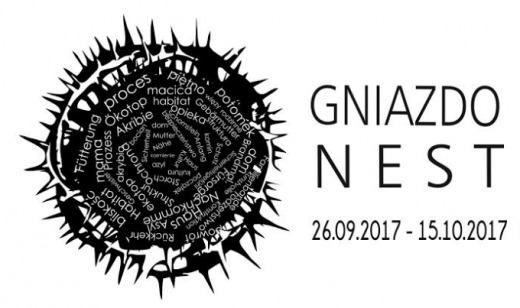Artists: Krzysztof Białowicz, Dorota Chilińska, Martyna Jastrzębska, Katarzyna Józefowicz, Grzegorz Klaman, Anna Kola, Diana Rönnberg, Kordian Rönnberg, Arkadiusz Soroka, Marian Stępak, Tomasz Wlaźlak, Iwona Zając
Base: I, you, he, she , it, we, you, they
Superstructure: an outside sphere – a family, a house, an inside sphere – ego + alter ego + id
an emotional and intellectual baggage of direct and indirect experience that we accumulate in ourselves (each of us is their own nest, in which something/someone is constantly nesting) warmth, smell, fight, mum, culture, closeness, retreat, route, shelter, sense of safety, family ties, intricate construction, environment, surroundings, security, thallus, soil, synergy, Lot – Gallery at Vistula, kitchen, cull, asylum, home, return, uterus, habitat, ecotope, wasps, hatchling, stork, security, preservation, beginning, home, siblings, feeding, meticulousness, structure, care, Bogna, stork, chimney, hatchling, offspring, feather, bench, process, stigma, descendant, shelter, a hiding place of a very delicate and fragile make-up that needs to be constantly maintained, pallet, hellhole, lair, roof, coronet, community, constraint, settling down, security.
“Unless one likes complexity one cannot feel at home in the twenty-first century.”[1]
“Can the significance of existence be depleted? Assuming that existence is a value (and this is the assumption I make), even though it can be a curse, it does not change a thing when I ask: can anyone annihilate the value of this curse?”[2]
The eponymous Nest was made, in different ways, by the artists who represent two academic centres in Poland: the Academy of Fine Arts in Gdańsk and the Faculty of Fine Arts in Toruń. The intimate statements, first written down, then visualized, drag the viewers in THEIR nests, more or less metaphorical, at times intensely literal, or ambiguous. In this case, the nest is a synonym of three words articulated by each of the artists engaged in the exhibition. They built their nests for themselves and for others.
The exhibition project is a critical commentary on the contemporary times, stuffy and increasingly alarming. While analyzing the reality in which she lives, Rosi Braidotti writes that there came to existence a new ethics based on the experience of pain, sensitivity, and changeability.[3] According to the philosopher, these three components should be constitutive of our humanity and our sensitivity toward the world. Empathizing and accepting the continuous fluctuation constitute the character of the modern-day human.
[1] Rosi Braidotti, Metamorphoses. Towards a Materialist Theory of Becoming, Cambridge–Malden, MA 2002, p. 1.
[2] Jolanta Barch-Czaina, Szczeliny istnienia, Warsaw 1992, p. 139, trans. mine.
[3] Rosi Braidotti, Nomadic Subjects: Embodiment and Sexual Difference in Contemporary Feminist Theory, New York 2011.
tł. Marta Sibirska
